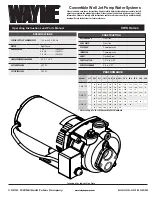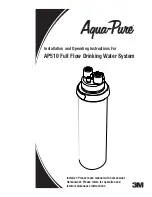
4. Operation
Starting the Pressure Tank
Unit:
FILL
RUN
q
0
e
q
w
FILL
RUN
q
DANGER! Electric shock!
v
Before filling the pump, unplug the equipment from
the mains.
WARNING! Pump running dry!
v
Fill the pump to the overflow (approx. 2 to 3 l) with
water each time before the pump is switched on,
so it does not run dry.
1. Unscrew the cover
0
of the filter chamber by hand.
2. Turn the rotary switch
q
to
FILL.
The integrated non-return valve will open.
3. Open the air bleed
w
.
4. Open any valves in the delivery line (watering accessories, water
stop, etc.) and drain off any residual water in the delivery hose
so that the air can escape during filling and priming.
5. Slowly pour pumping medium (approx. 2 to 3 l) through the filler
neck
e
until water emerges from the air bleed
w
.
6. Screw the filter chamber cover
0
closed again, turning by hand
until it stops.
7.
Close venting
w
and turn rotary switch
q
to RUN.
8.
Insert the mains plug into a 230 V mains socket.
CAUTION! The pump will start immediately!
Once the maximum pressure is reached the pump will switch
off automatically. When the pressure falls below the minimum
value due to water being drawn off, the pump will switch on again
automatically.
The maximum self-priming head of 8 m is only achieved if the
pump is filled until it overflows from the filler connection
e
and
the delivery hose is held high enough during self-priming so that
no water can escape from the pump via the delivery hose. It is
not necessary to hold up the delivery hose if filled suction hoses
with backflow preventer are used.
ECO switch:
ECO
MAX
r
In order to save energy (up to 15 %), the cut-out pressure on the
pump can, depending on the individual application, be regulated
between
ECO and MAX (the pressure difference between ECO
and
MAX totals approx. 1 bar).
v
Turn the
ECO rotary switch
r
to the required position.
Note on the use of sprinklers:
Depending on the flow rate of the sprinkler, an uneven watering
pattern may occur through the pump being switched on and off
automatically.
16
GB



































